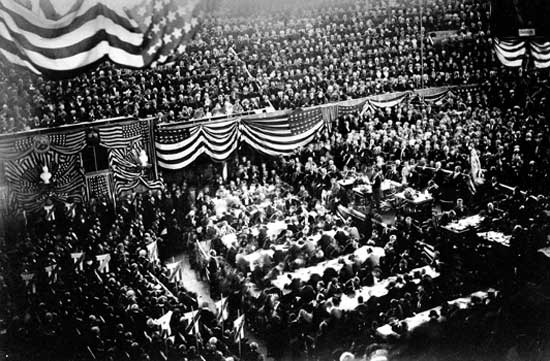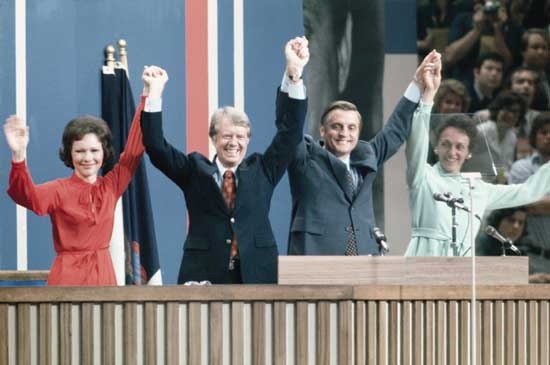political convention
American politics
 meeting of delegates of a political party at the local, state, provincial, or national level to select candidates for office and to decide party policy. As representative organs of political parties, party conventions—or party conferences as they are commonly called in Europe—also may elect executive committees of the parties and adopt rules governing the party's organization. In practice they also act as rallies for the election campaigns that follow.
meeting of delegates of a political party at the local, state, provincial, or national level to select candidates for office and to decide party policy. As representative organs of political parties, party conventions—or party conferences as they are commonly called in Europe—also may elect executive committees of the parties and adopt rules governing the party's organization. In practice they also act as rallies for the election campaigns that follow.Before the development of conventions in the United States in the 1830s, American political parties selected candidates and policies in informal caucuses (caucus) of the parties' congressional delegations. Conventions were introduced to eliminate the abuses of the caucus system and were expected, through their open and public conduct of business, to be more democratic and less amenable to control by party bosses and machines. However, most of the real business of conventions was conducted in informal meetings of various delegates and leaders, and activity on the floor of the convention was usually merely a reflection of behind-the-scenes decisions and compromises. The corruption of the nomination process by party oligarchies prompted most states to adopt a system of primary elections (primary election) for the nomination of candidates for state and local elective offices, though conventions continued to play an important role in endorsing party candidates.
 The frequency with which party conventions are held varies between countries. In many European countries, for example, each major political party holds an annual national conference, during which party leaders address grass-roots members and debate party policy. In the United States, national party conventions are held every four years to nominate candidates for the presidency (presidency of the United States of America) and vice presidency (vice president of the United States of America) and to adopt a national platform. There also are local and state conventions, though the rules and function of these vary from state to state.
The frequency with which party conventions are held varies between countries. In many European countries, for example, each major political party holds an annual national conference, during which party leaders address grass-roots members and debate party policy. In the United States, national party conventions are held every four years to nominate candidates for the presidency (presidency of the United States of America) and vice presidency (vice president of the United States of America) and to adopt a national platform. There also are local and state conventions, though the rules and function of these vary from state to state. At first, voting strength at both the Democratic (Democratic Party) and Republican (Republican Party) party conventions in the United States was apportioned among the states according to their electoral college vote, with each state often allocated two convention votes per elector. For its 1916 convention, the Republican Party adopted rules curtailing the representation of congressional districts in which the Republican vote was light. Both parties later began giving “bonus” votes to states carried by the party in a previous election.
At first, voting strength at both the Democratic (Democratic Party) and Republican (Republican Party) party conventions in the United States was apportioned among the states according to their electoral college vote, with each state often allocated two convention votes per elector. For its 1916 convention, the Republican Party adopted rules curtailing the representation of congressional districts in which the Republican vote was light. Both parties later began giving “bonus” votes to states carried by the party in a previous election. Although presidential and vice presidential candidates continue to be nominated by the whole convention, the growth of presidential primaries, especially after 1968, increasingly limited the role of conventions to ratifying the candidate already selected by the voters. Although many conventions have taken several ballots to declare a winner—especially because until 1936 the Democratic Party mandated that its nominee receive a two-thirds majority—nominations increasingly have been decided on the first ballot.
Although presidential and vice presidential candidates continue to be nominated by the whole convention, the growth of presidential primaries, especially after 1968, increasingly limited the role of conventions to ratifying the candidate already selected by the voters. Although many conventions have taken several ballots to declare a winner—especially because until 1936 the Democratic Party mandated that its nominee receive a two-thirds majority—nominations increasingly have been decided on the first ballot.At the beginning of the 21st century, the great majority of Republican and Democratic party delegates were selected through primaries. Most of the delegates elected in primaries are required to vote in a way that reflects the voters' choice, at least on the first ballot. A candidate who has won enough delegate votes in the primaries can thus be certain of winning the nomination on the first ballot; this reduces the power of party leaders and favourite-son candidates to broker delegate votes to candidates in exchange for political favours. The bargaining strength of party leaders also has been diminished by the widespread use of public-opinion (public opinion) polls to measure the popularity of the candidates and to reveal their support by region and demographic group. If the primaries and the polls do not make the nomination a foregone conclusion, they generally eliminate all but the serious contenders before the convention.
With the advent of television, national conventions in the United States became spectacles that received a great deal of attention and nearly gavel-to-gavel coverage. In subsequent years, as the conventions declined in importance relative to the primary system, television coverage decreased dramatically.
 The national conventions in the United States have been criticized throughout their history as undemocratic spectacles. Critics have proposed replacing them with some form of national presidential primary. By contrast, defenders argue that, besides promoting party unity and enthusiasm, conventions allow compromise and tend to produce nominees and platforms that represent the political centre rather than the extremes. Because elected officials must appeal to both party leaders and the public to function effectively, supporters of conventions claim that they are a good test of how well a candidate will perform in office.
The national conventions in the United States have been criticized throughout their history as undemocratic spectacles. Critics have proposed replacing them with some form of national presidential primary. By contrast, defenders argue that, besides promoting party unity and enthusiasm, conventions allow compromise and tend to produce nominees and platforms that represent the political centre rather than the extremes. Because elected officials must appeal to both party leaders and the public to function effectively, supporters of conventions claim that they are a good test of how well a candidate will perform in office.Party conferences outside the United States also have received similar criticisms. For example, at British Labour Party conferences in the early 1980s, delegates often adopted policies far outside the political mainstream and at odds with much of the party leaders. These high-profile conferences sometimes are targeted for violence. For example, the Irish Republican Army attempted to assassinate British Prime Minister Margaret Thatcher (Thatcher, Margaret) at the Conservative Party conference in 1984.